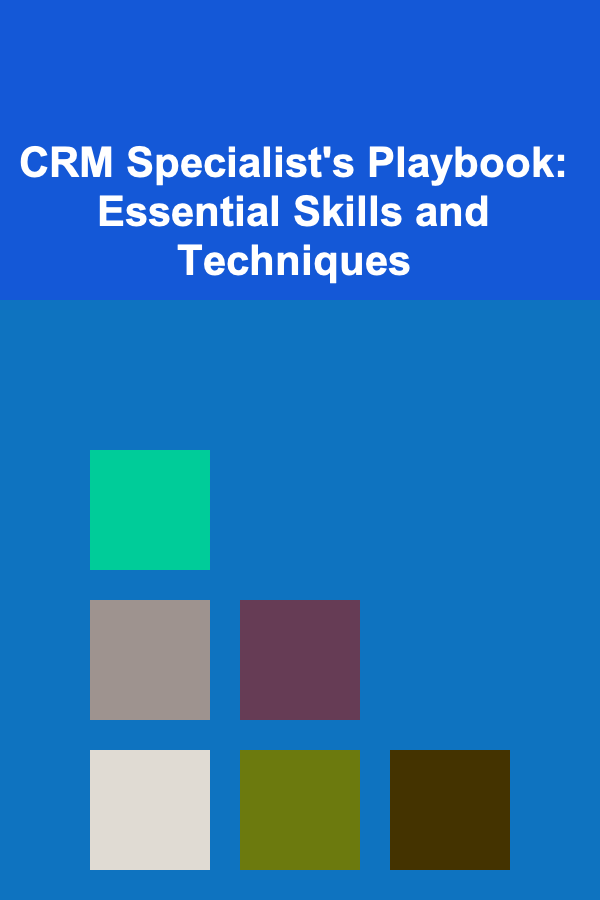
CRM Specialist's Playbook: Essential Skills and Techniques
ebook include PDF & Audio bundle (Micro Guide)
$12.99$7.99
Limited Time Offer! Order within the next:

In the dynamic world of business, maintaining strong, lasting relationships with customers is no longer optional---it's essential. Customer Relationship Management (CRM) specialists play a pivotal role in fostering these connections, and mastering the necessary skills and techniques can significantly enhance customer satisfaction, loyalty, and, ultimately, company revenue. Whether you're just starting as a CRM specialist or seeking to refine your expertise, understanding the key skills and strategies can set you apart in a competitive market.
This playbook will delve into the fundamental skills and techniques every CRM specialist should cultivate, covering everything from technical knowledge to soft skills that allow you to build more meaningful relationships with customers.
Understanding CRM Fundamentals
Before diving into the specific techniques and skills, it's crucial to understand the core purpose and function of CRM. CRM isn't just about using software---it's about creating and maintaining deep, long-term relationships with your customers. It involves tracking interactions, managing customer data, and ensuring that all customer-facing departments (sales, marketing, support) are aligned in providing an outstanding experience.
A CRM specialist is responsible for using CRM tools and strategies to manage customer interactions and improve business processes. The main goal is to ensure that customers have a seamless experience across all touchpoints with the company, ultimately leading to higher satisfaction and retention.
Mastering CRM Software and Tools
A CRM specialist's first line of defense is the CRM software itself. From Salesforce to HubSpot, a wide variety of platforms are available, each offering a range of features to help manage customer relationships effectively. However, no matter which platform you're using, the fundamental principle remains the same: capturing and organizing customer data to improve business outcomes.
Key Skills:
- CRM Tool Proficiency: Understanding how to navigate and leverage the capabilities of your CRM platform is critical. This includes managing data entry, workflow automation, and using analytics features to gather insights.
- Data Integration: CRM systems often need to be integrated with other tools (marketing automation software, email platforms, etc.). Being able to integrate these systems efficiently ensures a seamless flow of data across departments and teams.
- Customization: Many CRM tools allow for a degree of customization---whether it's modifying fields, workflows, or reporting formats. A CRM specialist should be able to tailor the system to meet specific business needs.
- Reporting and Dashboards: Creating, interpreting, and acting on reports is essential. CRM specialists should know how to create dashboards that provide real-time insights into sales performance, customer satisfaction, and other relevant metrics.
Techniques:
- Spend time understanding the full breadth of features in your CRM platform.
- Customize the CRM to fit your company's specific needs and workflow.
- Learn to build reports that provide actionable insights into customer behavior and business performance.
Data Management and Analysis
CRM is heavily data-driven, and being able to effectively manage and analyze data is one of the most important skills for any CRM specialist. The data collected from customers provides invaluable insights into behavior, preferences, and pain points, which can help shape personalized strategies.
Key Skills:
- Data Segmentation: Being able to segment your customer base into different groups (e.g., by demographics, behavior, or purchase history) is essential for targeted marketing efforts. For instance, segmenting by high-value customers allows you to tailor strategies that maximize their engagement.
- Data Quality Management: Clean, accurate data is crucial for making informed decisions. Regularly check for duplicate records, missing information, and outdated data to ensure your CRM remains an accurate reflection of your customer base.
- Advanced Analytics: CRM specialists should be comfortable using advanced analytical tools that are often built into CRM platforms. Understanding how to use data visualizations, perform trend analysis, and measure key performance indicators (KPIs) such as Customer Lifetime Value (CLV) or Customer Acquisition Cost (CAC) can inform more strategic decisions.
- Customer Sentiment Analysis: Knowing how to gauge customer sentiment through reviews, support interactions, and feedback is a powerful skill that can help CRM specialists anticipate issues and proactively resolve them.
Techniques:
- Use segmentation to create highly targeted campaigns that are more likely to convert.
- Regularly clean and update customer data to prevent errors and miscommunication.
- Use predictive analytics to anticipate customer behaviors and trends, and tailor strategies accordingly.
Automation and Workflow Optimization
In today's fast-paced business environment, manual processes are no longer sustainable. CRM specialists should leverage automation to streamline repetitive tasks, reduce errors, and improve efficiency. Automation allows you to focus on high-value activities like strategic planning and customer engagement.
Key Skills:
- Workflow Automation: Automation involves setting up rules and triggers that allow actions to happen automatically. For example, sending a follow-up email to a customer after they make a purchase, or automatically moving a lead from one stage of the sales funnel to the next.
- Lead Nurturing: Lead nurturing is a key area where automation shines. CRM specialists can create automated email sequences to guide prospects through the sales funnel based on their behavior (e.g., downloading an eBook or attending a webinar).
- Customer Support Automation: Automating common customer service tasks, such as ticket creation or follow-up emails, helps ensure timely responses and better customer satisfaction.
- Marketing Automation: With marketing automation tools, CRM specialists can set up email campaigns that automatically target the right customers with personalized content.
Techniques:
- Identify repetitive processes that can be automated and create rules to handle them.
- Set up lead nurturing workflows that automatically trigger communication based on prospect behavior.
- Integrate CRM with your email marketing platform to automatically send personalized content.
Personalization and Customer Engagement
Customers expect personalized experiences---whether it's receiving offers relevant to their interests or getting timely responses to their inquiries. Personalization goes beyond addressing customers by their first names in emails; it's about creating unique, meaningful interactions that reflect an understanding of the customer's preferences and behaviors.
Key Skills:
- Personalized Messaging: Being able to craft messages tailored to the individual customer is a key skill. This involves understanding their preferences, purchase history, and past interactions with the brand.
- Behavioral Triggers: Personalization can also be driven by specific actions a customer takes (e.g., abandoning a shopping cart). Setting up behavioral triggers to send personalized offers or reminders is an effective way to engage customers.
- Customer Journey Mapping: Understanding the steps customers take from first contact to final purchase---and beyond---is essential for delivering a seamless, personalized experience. Mapping the customer journey helps identify key touchpoints where you can engage customers in a relevant way.
- Cross-Channel Engagement: Personalization doesn't happen in a vacuum. CRM specialists need to ensure customers have a consistent experience across all channels, from email to social media to in-store experiences.
Techniques:
- Use customer data to tailor messaging and create relevant offers.
- Set up behavioral triggers that send personalized communications based on actions like cart abandonment or frequent browsing of a specific product category.
- Ensure customers have a seamless experience across all touchpoints---online and offline.
Customer Retention Strategies
While customer acquisition is important, retaining existing customers is more cost-effective and can drive long-term business growth. As a CRM specialist, you need to focus on building loyalty and trust, ensuring that customers remain engaged and satisfied with your products or services.
Key Skills:
- Loyalty Programs: Many CRM systems allow businesses to track customer purchases and reward loyalty. A CRM specialist can create and manage programs that incentivize repeat purchases, whether it's through discounts, points, or exclusive access to products.
- Customer Feedback Loops: Regularly gathering feedback from customers---through surveys, reviews, or support tickets---is crucial for improving products and services. CRM specialists can use this feedback to refine customer engagement strategies and proactively resolve issues.
- Churn Analysis: Monitoring when and why customers stop doing business with your company is a critical skill. Understanding churn can help CRM specialists develop targeted campaigns to re-engage at-risk customers.
- Engagement Campaigns: Engaging customers after they make a purchase is vital. CRM specialists can set up re-engagement campaigns (e.g., reminders about complementary products, personalized offers) that keep customers coming back.
Techniques:
- Implement loyalty programs that reward repeat purchases and encourage customer retention.
- Regularly monitor customer feedback to improve the customer experience.
- Analyze churn data to develop campaigns that target at-risk customers and win them back.
Conclusion
The role of a CRM specialist is multifaceted, combining technical skills with customer-centric strategies to drive business success. By mastering CRM software, understanding data analysis, leveraging automation, personalizing customer engagement, and implementing retention strategies, CRM specialists play a critical role in creating positive customer experiences that lead to long-term loyalty and growth. Continuously refining these skills will not only improve your CRM strategy but will also position you as a valuable asset in any organization looking to enhance its customer relationships.

How to Build a Flexible Riding Schedule for Extra Income
Read More
How to Create a Holiday-Themed Gallery Wall for Your Home
Read More
How to Market Your Rental Property During Off-Season
Read More
How to Organize Group Travel Plans for Large Families or Friends
Read More
How to Use Financial Apps to Simplify Money Management
Read More
How to Use Pegboards for Versatile Home Organization
Read MoreOther Products

How to Build a Flexible Riding Schedule for Extra Income
Read More
How to Create a Holiday-Themed Gallery Wall for Your Home
Read More
How to Market Your Rental Property During Off-Season
Read More
How to Organize Group Travel Plans for Large Families or Friends
Read More
How to Use Financial Apps to Simplify Money Management
Read More